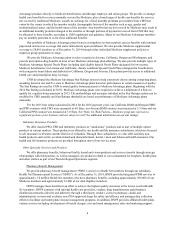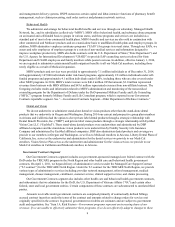Health Net 2014 Annual Report Download - page 20
Download and view the complete annual report
Please find page 20 of the 2014 Health Net annual report below. You can navigate through the pages in the report by either clicking on the pages listed below, or by using the keyword search tool below to find specific information within the annual report.18
residents with incomes up to 133% of the FPL. Medicaid expansion has driven a significant increase in
our Medicaid enrollment in 2014. For additional discussion of Medicaid expansion and our Medicaid
program, see the discussion above under the heading “—Segment Information—Western Region
Operations Segment—Medicaid and Related Products.”
For further information on certain of the provisions above and how they have impacted our operations in 2014,
see Note 2 to our consolidated financial statements under the heading “Accounting for Certain Provisions of the ACA”
and “Item 7. Management's Discussion and Analysis of Financial Condition and Results of Operations—Western
Region Operations Reportable Segment.”
Other provisions of the ACA include, among other things:
• imposing an excise tax on high premium insurance policies;
• requiring premium rate reviews in certain lines of business;
• stipulating a minimum medical loss ratio (as adopted by the Secretary of HHS);
• limiting Medicare Advantage payment rates;
• increasing mandated “essential health benefits” in some lines of business;
• specifying certain actuarial value and cost-sharing requirements;
• eliminating medical underwriting for medical insurance coverage decisions, including “guaranteed
availability” with respect to individual and group coverage;
• limiting the ability of health plans to vary premiums based on assessments of underlying risk in the
individual and small group markets;
• increasing restrictions on rescinding coverage;
• prohibiting some annual and all lifetime limits on amounts paid on behalf of or to our members;
• limiting the tax-deductible amount of compensation paid to health insurance executives;
• requiring that most individuals obtain health care coverage or pay a penalty, commonly referred to as the
“individual mandate”;
• imposing a sales tax on medical device manufacturers; and
• increasing fees on pharmaceutical manufacturers.
The schedule for implementation of the provisions of the ACA generally varies from as early as enactment to as
late as 2018. A number of potentially significant provisions of the ACA became effective January 1, 2014, including the
health insurer fee, the operation of QHPs purchased through the exchanges, the premium stabilization provisions
described above, the guaranteed availability requirement, Medicaid expansion and the individual mandate. Other
provisions, such as the excise tax on certain high-premium insurance policies, and the employer mandate for certain
small- and mid-size employers, will not take effect until a later date. However, some of these provisions have had an
earlier impact on our operations, including in connection with the setting of our premium rates and general and
administrative expenses incurred in preparation for the ACA as discussed above.
Certain legal and legislative challenges to the ACA remain including, but not limited to litigation in Arizona
related to Medicaid expansion and a challenge to the validity of premium tax credits on federally-facilitated exchanges
that is currently scheduled to be heard in the U.S. Supreme Court.
We and other health insurance companies face uncertainty and execution risk due to the multiple, complex ACA
implementations that are required in abbreviated time frames in new markets. Additionally, in many cases, our
operational and strategic initiatives must be implemented in evolving regulatory environments and without the benefit
of established market data. In addition, the lack of operating experience in these new marketplaces for insurers and, in
certain cases, providers and consumers, increases the likelihood of a dynamic marketplace that may require us to adjust
our operating and strategic initiatives over time, and there is no assurance that insurers, including us, will be able to do
so successfully. Our execution risk encapsulates, among other things, our simultaneous participation in the exchanges,
Medicaid expansion and the CCI, as described under the heading “—Segment Information—Western Region
Operations—California Coordinated Care Initiative” above. These initiatives require us to effectively incorporate new
and expanded populations and, among other things, required us to effectively and efficiently restructure our provider
network to, among other things, meet the ACA’s dynamic environment. Any delay or failure by us to execute our
operational and strategic initiatives with respect to health care reform or otherwise appropriately react to the legislation,
implementing regulations, actions of our competitors and the changing marketplace could result in operational
























